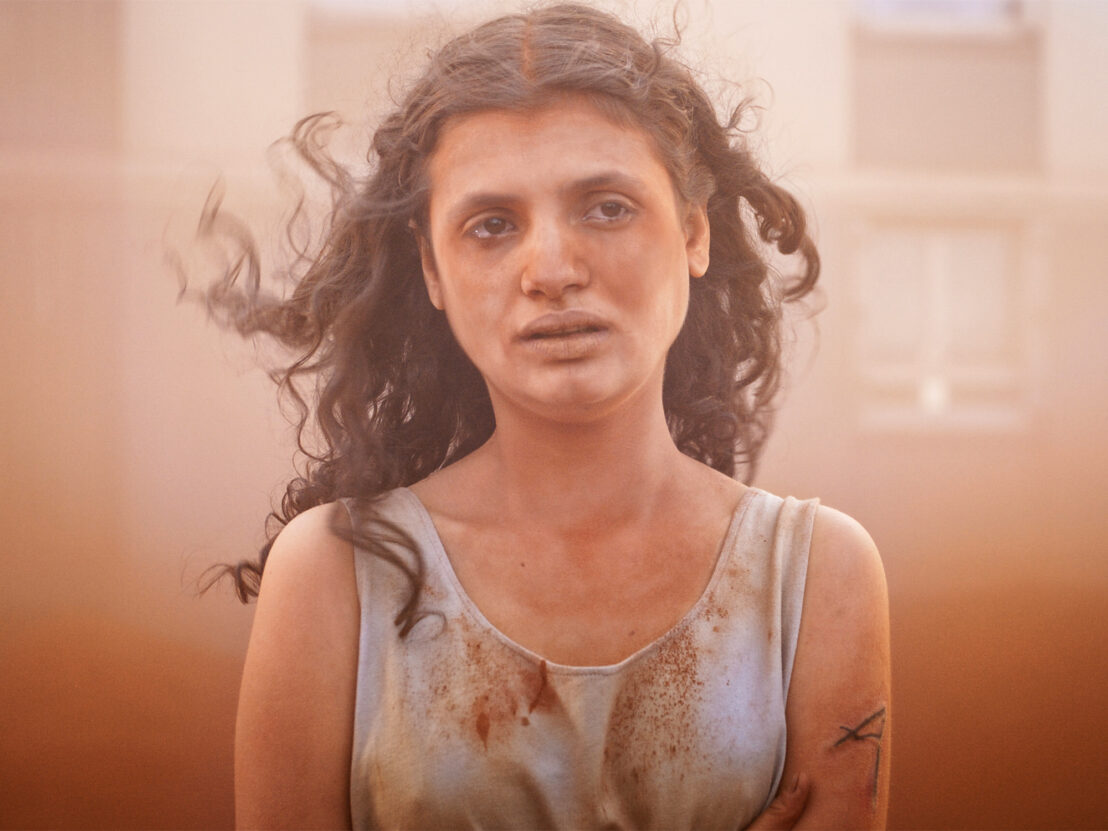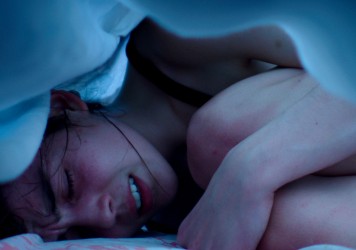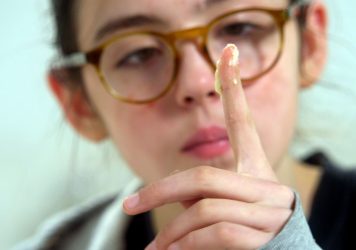
Returning to Cannes after winning the Palme d'Or for Titane, Julia Ducournau shifts gears with a unique drama inspired by the AIDS crisis.
“I’m not afraid to die.” The refrain of Nick Cave and the Bad Seeds’ ‘The Mercy Seat’ seems hardcoded into the DNA of Julia Ducournau’s third feature, which sees the Palme d’Or winner move away from the shock and awe body horror of Raw and Titane into something somehow sadder and stranger. That’s how 13-year-old Alpha (Mélissa Boros) fancies herself, reckless and angsty in her adolescent way, kicking against her mother’s (Goldshifteh Farahami) parenting with drinking and smoking and having an affair with her classmate Adrien even though he already has a girlfriend. But if Alpha is the screaming guitars and defiant snarl of Cave’s first iteration of this song, her Uncle Amin (Tahar Rahim) is the soul-wrenching resignation of the version recorded a quarter of a century later. He turns up mid heroin detox, sprawled on Alpha’s bedroom floor, rail thin, shivering and sweating through his clothes with trackmarks on his arms. Alpha doesn’t recognise him; she threatens him with a knife. Amin just laughs.
The stab of a different needle sets Alpha into motion: when the teenager returns from a house party with a crude stick-n-poke tattoo of the letter A on her arm (not quite a scarlet letter but not far off), her mother is understandably angry, but more than that, she’s frightened. A fatal blood-borne illness has swept through society, causing the sick to slowly, painfully turn to stone, and as one of the few doctors willing to treat the sick, she’s witnessed it first hand. Alpha’s cluelessness sends her mother into a tailspin. Amin has already contracted the disease through his drug use and she can’t bear to lose another loved one.
The unnamed virus is an obvious stand-in for AIDS, perceived with the same hushed disgust by outsiders. In Alpha’s English class her teacher (Finnegan Oldfield) is subject to homophobic slurs from his students; when Alpha later sees him in the hospital waiting room, accompanying his sick partner, she’s the only person who doesn’t recoil. But the painful transformation of the sick into stone relics is a curious twist. They become monuments to the very thing that killed them, not just the sickness but the treatment of the sick – their ostracisation and abandonment. Here Ducournau positions the dead as martyrs, as worthy of a monument as any king or general, a testament to the burden of shame placed upon them by society which placed the blame for AIDS at the feet of the LGBTQ+ community. The burden of shame that reverberated for generations and still isn’t taught in schools, as we slide backwards towards conservatism in our present and run the risk of learning nothing from the past.
In school, rumours swirl that Alpha has contracted the virus and she is bullied accordingly – she remains stony-faced, but her fierce defence mechanisms can only hold out for so long, especially when Adrien turns on her too. She seeks comfort in her uncle’s company, the only person truly willing to be honest with her. (The only person who seems to truly understand her.) Even dying Amin is fiercely alive, his mouth fixed into a grin like he understands a joke no one else is in on, as he’s begging Alpha and her mother to let him go. It’s a towering performance of pathos but not pity from Tahar Rahim, and the newcomer Mélissa Boros, with her expressive eyes and wild animal physicality, is a revelation as his foil. There’s such loneliness here, of a teenage girl, a single mother, a drug addict and scores of the sick, pushed to the fringes and bound by their isolation.
Meanwhile the timeline slips between the past and present, as Alpha’s exhausted mother becomes just like her own, grasping at old superstitions. Her rational, scientific mind is traumatised by her own experience and Amin’s illness as well as the new threat to her daughter; she remembers how her mother used to think Amin was sick with ‘The Red Wind’ and could be cleansed with water. In her grief she’s willing to believe in anything that might give her a little longer with a loved one.
It’s become a running joke how many films seem to revolve around the vague concept of grief these days, but considering it’s only five years since a global pandemic, it’s understandable that the collective process of mourning continues to dominate art and culture. While Covid was largely different from the AIDS pandemic due to the inherently homophobic and classist narrative pedalled during the 70s and 80s that led to thousands more deaths and delays in healthcare advancement, it’s hard to not see the frozen stone statues of Alpha and think of how our collective relationship to death might have changed as a result of what we lived through (then and now). What’s more, grief is an undeniable part of the human experience: to love someone is to eventually grieve them. It’s an inherently vulnerable act, and Alpha is an inherently vulnerable film, no gross-out moments or big body horror showstoppers for us – or Ducournau – to hide behind. Alpha is as thorny as her previous two features, but there’s something lonely and longing here too.
But if death is a part of life, so is dancing. Kissing. Laughing. Running. Holding a ladybird in the palm of your hand, gentle and awed, or arguing with someone who loves you down to your bones. For all its cool stone, Alpha is not a cold film, and vibrates with life in the way Raw pulsed with desire and Titane with white-hot fury. Grieving is a process of letting go, but it’s also a process of finding the parts of people we’ve lost that eventually become a part of us – of learning how to carry on even as we can’t forget.
To keep celebrating the craft of film, we have to rely on the support of our members. Join Club LWLies today and receive access to a host of benefits.
Published 19 May 2025

By Sam Bodrojan
All hail the new flesh in Julia Ducournau’s dreamlike fable of a fractured young dancer grappling with the fire inside her.

By Ed Frankl
Julia Ducournau’s French campus cannibal horror serves up plenty of food for thought.

Before she was a Palme d'or winner, Ducournau made a creepy little short about a teenager undergoing a strange transformation.